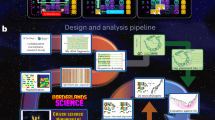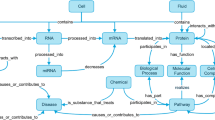Abstract
The postdoctoral workforce comprises a growing proportion of the science, technology, engineering and mathematics (STEM) community, and plays a vital role in advancing science. Postdoc professional development, however, remains rooted in outdated realities. We propose enhancements to postdoc-centred policies and practices to better align this career stage with contemporary job markets and work life. By facilitating productivity, wellness and career advancement, the proposed changes will benefit all stakeholders in postdoc success—including research teams, institutions, professional societies and the scientific community as a whole. To catalyse reform, we outline recommendations for (1) skills-based training tailored to the current career landscape, and (2) supportive policies and tools outlined in postdoc handbooks. We also invite the ecology and evolution community to lead further progressive reform.
This is a preview of subscription content, access via your institution
Access options
Access Nature and 54 other Nature Portfolio journals
Get Nature+, our best-value online-access subscription
$29.99 / 30 days
cancel any time
Subscribe to this journal
Receive 12 digital issues and online access to articles
$119.00 per year
only $9.92 per issue
Buy this article
- Purchase on Springer Link
- Instant access to full article PDF
Prices may be subject to local taxes which are calculated during checkout

Similar content being viewed by others
Data availability
All data generated or analysed during this study are included in the published Perspective (and its Supplementary Information files).
References
Jaeger, A. J. & Dinin, A. J. The Postdoc Landscape: the Invisible Scholars (Academic Press, 2017).
Rybarczyk, B., Lerea, L., Lund, P. K., Whittington, D. & Dykstra, L. Postdoctoral training aligned with the academic professoriate. BioScience 61, 699–705 (2011).
Davis, G. in Science and Engineering Careers in the United States: An Analysis of Markets and Employment (eds Freeman, R. & Goroff, D. L.) 99–127 (Univ. Chicago Press, 2009).
Feldon, D. F. et al. Postdocs’ lab engagement predicts trajectories of PhD students’ skill development. Proc. Natl. Acad. Sci. USA 116, 20910–20916 (2019).
Holzinger, F., Schiffbänker, H., Reidl, S., Hafellner, S. & Streiche, J. in Gender and Precarious Research Careers, a Comparative Analysis (eds Murgia, A. & Poggio, B.) 209–235 (Routledge, 2018).
Andalib, M. A., Ghaffarzadegan, N. & Larson, R. C. The postdoc queue: a labour force in waiting. Syst. Res. Behav. Sci. 35, 675–686 (2018).
Grinstein, A. & Treister, R. The unhappy postdoc: a survey based study. F1000Res. 6, 1642 (2018).
National Academy of Sciences, National Academy of Engineering, Institute of Medicine The Postdoctoral Experience Revisited (The National Academies Press, 2014).
Lancaster, A. K., Thessen, A. E. & Virapongse, A. A new paradigm for the scientific enterprise: nurturing the ecosystem. F1000Res. 7, 803 (2018).
Dietz, J. S. & Bozeman, B. Academic careers, patents, and productivity: industry experience as scientific and technical human capital. Res. Policy 34, 349–367 (2005).
Åkerlind, G. S. Postdoctoral researchers: roles, functions and career prospects. High. Educ. Res. Dev. 24, 21–40 (2005).
Ferguson, K., Huang, B., Beckman, L. & Sinche, M. National Postdoctoral Association Institutional Policy Report 2014: Supporting and Developing Postdoctoral Scholars (National Postdoctoral Association, 2014).
Shaw, A. K. et al. Ecology postdocs in academia: primary concerns and possible solutions. Bull. Ecol. Soc. Am. 96, 140–152 (2015).
Hampton, S. E. & Labou, S. G. Careers in ecology: a fine-scale investigation of national data from the U.S. Survey of Doctorate Recipients. Ecosphere 8, e02031 (2017).
Blickley, J. L. et al. Graduate student’s guide to necessary skills for nonacademic conservation careers. Conserv. Biol. 27, 24–34 (2013).
St. Clair, R. et al. The “new normal”: adapting doctoral trainee career preparation for broad career paths in science. PLoS ONE 12, e0177035 (2017).
van der Weijden, I., Teelken, C., de Boer, M. & Drost, M. Career satisfaction of postdoctoral researchers in relation to their expectations for the future. High. Educ. 72, 25–40 (2016).
Foote, K. E. Creating a community of support for graduate students and early career academics. J. Geogr. High. Educ. 34, 7–19 (2010).
Agarwal, R. & Ohyama, A. Industry or academia, basic or applied? Career choices and earnings trajectories of scientists. Manage. Sci. 59, 950–970 (2013).
National Academies of Sciences, Engineering and Medicine Graduate STEM Education for the 21st Century (National Academies Press, 2018).
Konsortium Bundesbericht Wissenschaftlicher Nachwuchs Bundesbericht Wissenschaftlicher Nachwuchs 2017: Statistische Daten und Forschungsbefunde zu Promovierenden und Promovierten in Deutschland (W. Bertelsmann Verlag, 2017).
Canal Domínguez, J. F. & Rodríguez Gutiérrez, C. Wage differences among Ph.D.s by area of knowledge: are science areas better paid than humanities and social ones? The Spanish case. J. Educ. Work 26, 187–218 (2013).
Bloch, C., Graversen, E. K. & Pedersen, H. S. Researcher mobility and sector career choices among doctorate holders. Res. Eval. 24, 171–180 (2015).
Derting, T. L. et al. Assessing faculty professional development in STEM higher education: sustainability of outcomes. Sci. Adv. 2, e1501422 (2016).
Smith, B. et al. COMPASS: navigating the rules of scientific engagement. PLoS Biol. 11, e1001552 (2013).
2017 Career Tracking Survey of Doctorate Holders: Project Report (European Science Foundation, 2017).
Postdoctoral Funding Schemes in Europe: Survey Report (Science Europe, 2016).
The Concordat to Support the Career Development of Researchers (The Concordat Strategy Group, 2019).
Roberts, G. G. SET for Success: The Supply of People with Science, Technology, Engineering and Mathematics Skills: The Report of Sir Gareth Roberts’ Review (HM Treasury, 2002).
Bubonya, M., Cobb-Clark, D. A. & Wooden, M. Mental health and productivity at work: does what you do matter? Labour Econ. 46, 150–165 (2017).
Evans, T. M., Bira, L., Gastelum, J. B., Weiss, L. T. & Vanderford, N. L. Evidence for a mental health crisis in graduate education. Nat. Biotechnol. 36, 282–284 (2018).
Panger, G., Tryon, J. & Smith, A. The Graduate Assembly Graduate Student Happiness & Well-Being Report 2014 (The Graduate Assembly UC Berkeley, 2014).
Auriol, L., Misu, M. & Freeman, R. A. Careers of Doctorate Holders: Analysis of Labour Market and Mobility Indicators OECD Science, Technology and Industry Working Papers (OECD, 2013).
McInroy, G., Lichten, C., Ioppolo, B., Parks, S. & Guthrie, S. International Movement and Science: A Survey of Researchers by the Together Science Can Campaign (RAND Corporation, 2018).
Yadav, A. & Seals, C. Taking the next step: supporting postdocs to develop an independent path in academia. Int. J. STEM Educ. 6, 15 (2019).
Hunt, J. & Eisenberg, D. Mental health problems and help-seeking behavior among college students. J. Adol. Heath 46, 3–10 (2010).
Hund, A. K. et al. Transforming mentorship in STEM by training scientists to be better leaders. Ecol. Evol. 8, 9962–9974 (2018).
Recotillet, I. PhD graduates with post-doctoral qualification in the private sector: does it pay off? Labour 21, 473–502 (2007).
Burk, H. G. & Eby, L. T. What keeps people in mentoring relationships when bad things happen? A field study from the protégé’s perspective. J. Vocat. Behav. 77, 437–446 (2010).
Lunsford, L. Doctoral advising or mentoring? effects on student outcomes. Mentor. Tutoring Partnersh. Learn. 20, 251–270 (2012).
Morrison, J. et al. Recognizing and Valuing the Mentoring of Undergraduate Research, Scholarship and Creative Activity (URSCA) by Faculty Members: Workload, Tenure, Promotion, and Award Systems Council on Undergraduate Research White Paper no. 2 (Council on Undergraduate Research, 2019).
Grogan, K. E. How the entire scientific community can confront gender bias in the workplace. Nat. Ecol. Evol. 3, 3–6 (2019).
Bruckmann, C. & Sebestyén, E. Ten simple rules to initiate and run a postdoctoral association. PLoS Comput. Biol. 13, e1005664 (2017).
Polka, J. K., Krukenberg, K. A. & McDowell, G. S. A call for transparency in tracking student and postdoc career outcomes. Mol. Biol. Cell 26, 1413–1415 (2015).
Visualizing Change: The Annual Report on the Economic Status of the Profession, 2016-17 (American Association of University Professors, 2017).
Feeney, M. K., Bernal, M. & Bowman, L. Enabling work? Family-friendly policies and academic productivity for men and women scientists. Sci. Public Policy 41, 750–764 (2014).
National Science Foundation, National Center for Science and Engineering Statistics NCSES Survey of Graduate Students and Postdoctorates in Science and Engineering, 1972-2017: Fall 2017 (US National Science Foundation, accessed 30th January 2020); https://go.nature.com/3da5uTP
Sinche, M. et al. An evidence-based evaluation of transferrable skills and job satisfaction for science PhDs. PLoS ONE 12, e0185023 (2017).
Acknowledgements
This publication is dedicated to the memory of the co-authors’ dear colleague, mentor, and friend Shengpan Lin. Funding was provided in part by the National Science Foundation (Cooperative Agreement no. DBI-0939454), the Swiss National Science Foundation (Early Postdoc Mobility Fellowship no. P2SKP3_184052 to M.Å.), the James S. McDonnell Foundation (Postdoctoral Fellowship Award Studying Complex Systems to H.F.M.) and the European Union’s Horizon 2020 research and innovation programme (Marie Sklodowska-Curie grant no. 799025 to K.J.M.). Any opinions, findings, and conclusions or recommendations expressed in this material are those of the author(s) and do not necessarily reflect the views of any of the funding agencies listed above.
Author information
Authors and Affiliations
Contributions
All authors contributed to the writing of this piece (M.Å., N.E., B.J.M.J., K.J.M., H.F.M., N.M., J.G.P., J.S., A.W.T., A.R.W., K.M.Y., E.R.Z. and E.G.). The project was designed by E.G. and led by E.G., M.Å. and N.E. M.Å. and N.E. contributed equally to this work, E.G. is the senior author and all other authors are listed in alphabetical order.
Corresponding author
Ethics declarations
Competing interests
The authors declare no competing interests.
Additional information
Publisher’s note Springer Nature remains neutral with regard to jurisdictional claims in published maps and institutional affiliations.
Supplementary information
Supplementary Information
Supplementary Tables 1–3 and Fig. 1.
Rights and permissions
About this article
Cite this article
Ålund, M., Emery, N., Jarrett, B.J.M. et al. Academic ecosystems must evolve to support a sustainable postdoc workforce. Nat Ecol Evol 4, 777–781 (2020). https://doi.org/10.1038/s41559-020-1178-6
Received:
Accepted:
Published:
Issue Date:
DOI: https://doi.org/10.1038/s41559-020-1178-6



